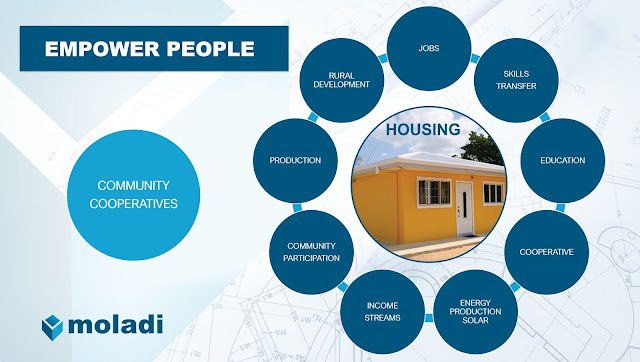Community co-operatives can empower people and fix joblessness
Community co-operatives can empower people and fix joblessness
 |
| Community co-operatives can empower people and fix joblessness - moladi SEBABATSO
MOSAMO Solve unemployment by tackling needsHousing guru says by using SA’s myriad sectoral challenges to provide a market, community co-operatives can empower people and fix joblessness. Millions of South Africans still live in shacks and government has a backlog of 3.2 million houses to provide but this and other sectoral challenges can be used to solve joblessness, housing entrepreneur Hennie Botes says. BY GUY ROGERS - 22 June 2021 Solve unemployment by
identifying SA’s problems and empowering communities to fix
them and in so doing give communities access to the economy. That is the message from
housing entrepreneur Hennie Botes whose plastic formwork mould invention has
seen Nelson Mandela Bay-based Moladi rolling out mass housing projects all over
the world. Botes said government’s
stated drive to combat unemployment was making no progress because it was
failing to link need and production and how precisely it was going to create
jobs. “With an unemployment
rate of 32.6% and the highest youth unemployment in the world, we can shout
from the rooftops that we are going to reduce joblessness but as the founding
father of the US, Benjamin Franklin said: "Well done is better than well said" “To solve the problem we
need to look at a product that has meaning, that will fill a need.” He bemoaned how more
money was being spent on salaries instead of building houses, saying this had
contributed to the 3.2 million housing backlog nationwide. President Cyril Ramaphosa
should begin by calling an imbizo of ministers, directors-general and premiers
to debate and prioritise SA’s challenges in different sectors. “We need to get our
political leaders on board and understanding how these challenges cross-cut to
impinge on the work of different departments and how all these challenges prop
up the new common enemy which is joblessness.” Botes, who started
out as an apprentice tool-and-die maker with the railways after matriculating
in Durban, said the next step was to establish a new entity that would
bridge the gap between politicians and the people. “Where at present there
is a political voice trying to drive job creation, this new co-operative would
supply a business voice. “Co-operatives would be
established around the country in every town and training would be given to
‘co-operative governors’ who would then assemble their best teams to represent
each community.” He said the co-operatives
would have a bank account and the departments would channel their budget
allocations to these accounts as projects were identified, tackled and
completed. “For housing projects the
co-operative would apply for subsidies on behalf of resident beneficiaries and
then the co-operatives would use that money to allow the community to build
their own houses. “In this way we shorten
the supply chain, eliminate corruption and create jobs. “The biggest hurdle for
any small medium and micro enterprise is the market and suddenly the market
would be right there. “They would be producing
for themselves and then as they completed what they had to do they could take
their skills to service other communities further afield.” Botes said the
co-operative would bring in a housing expert to teach them how to produce
component parts, from doors and windows to roof tiles, trusses and even paint,
and then to build the houses themselves. “I am confident Moladi
can build houses faster, stronger and for less but if the co-operative wants to
hire another company that would be fine. “The point is the
community and the co-operative representing them would be able to decide for
themselves.” He said government had
never used mass housing as leverage to negotiate with cement suppliers but the
co-operatives could do this. “It would give them
instant access to the economy, which so many of our people still do not have.” He said the envisaged
co-operative would be the first part of a broader plug-in strategy that could
be used to engage with many of SA’s challenges and opportunities. The self-sufficiency that
could grow from this process could address other problems like urbanisation. “Rural communities can be
encouraged to stay on the land, grow food and market it to the cities.” He said he had submitted
his proposal to 13 ministers and their directors-general including human
settlements minister Lindiwe Sisulu and the presidency. He said only higher
education and training minister Blade Nzimande had responded, saying “he “must
contact the Setas [Services Sector Education and Training Authorities]”. Ramaphosa’s acting
spokesperson, Tyrone Seale, told The Herald that: “The presidency project
management office will engage or guide Botes on his proposal.” Patrick Brennan,
researcher at the NMU department of development studies transition township
project said he agreed with Botes’s proposal. “We would like to know
more details but it’s exactly in line with what we are working towards. “It could trigger a huge
expansion in production and reduction in unemployment.” Human settlements
department spokesperson Steve Motale said they were committed to the empowerment
of SA citizens wherever projects were implemented. “We always encourage
contractors not only to build houses but to ensure there is skills transfer to
the community.” He said one of the
programmes the department was especially proud of was the people’s housing
process or zenzeleni where people were part of the building process, and in one
of the zenzeleni projects in Vulindlela in KwaZulu-Natal, 20,000 houses had
been delivered. “So, any programme that
is aimed at empowering our people has our full support.” In April 2019, three houses were handed over to beneficiaries in Walmer township by the human settlements and small business development departments in terms of the same process. - Link |
Keywords: moladi, community, co-operatives, empower, people, fix, joblessness, unemployment, SMME, poverty, education, Ministers, dg, Hennie Botes, housing, backlog, plastic, formwork, building, method



